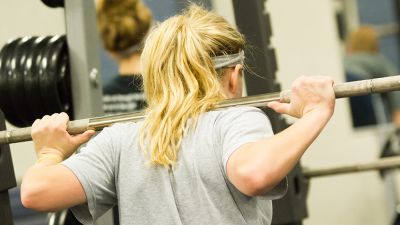
Pre-Athletic Training
Athletic trainers specialize in preventing, diagnosing and treating injuries and illnesses for athletes and other active people. As an athletic trainer, you will be a certified health care professional who guides athletes through their training programs and helps them recover from injury. You might also provide education to your patients to promote their overall health and wellness. Many athletic trainers work in educational settings, such as colleges, universities, elementary or secondary schools. Others work in hospitals, fitness centers, physician’s offices or for professional sports teams.
Concordia University, Nebraska’s pre-athletic training program will prepare you to attend graduate school to continue your education in athletic training. Through traditional coursework and hands-on experiential training, you will gain not only the prerequisites required to apply to the graduate school of your choice, but also develop a variety of skills that will be necessary in clinical practice as a certified athletic trainer practicing in the field of sports medicine.
Treat and prevent injuries in athletes!
Program Highlights
WHY STUDY PRE-ATHLETIC TRAINING AT CONCORDIA?
While studying pre-athletic training at Concordia, you will participate in service-learning opportunities on campus and in the local community, working with Special Olympics athletes, interning at various health facilities and collaborating with local high schools to promote physical education and an active, healthy lifestyle. You can also study abroad with health mission trips to places like Guatemala and Belize.
The pre-athletic training program at Concordia Nebraska will help you learn the necessary skills and qualifications you will need to continue your education and ultimately, find a career as an athletic trainer. Receive formal instruction in injury and illness prevention, first aid and emergency care, human anatomy, body composition assessment and nutrition to jump start your career with the tools you need to train and heal the next generation of athletes.
Accreditation
Concordia University, Nebraska is accredited by the Higher Learning Commission, a regional accreditation agency recognized by the U.S. Department of Education.
Micah Scholars Pre-Health Scholars Program
Micah Pre-Health Scholars is designed to help students be successful in their healthcare vocations through hands-on experiences, community support and graduate or professional school preparation.
Degree Goals
A pre-athletic training program graduate from Concordia University, Nebraska will be able to:
- Demonstrate entry-level athletic training knowledge, skills and abilities consistent with ethical sports medicine practices.
- Demonstrate attitudes, behaviors and practices that support patients’ general health, nutritional habits, physical activity and a healthy body composition.
- Exhibit effective critical thinking and communication skills.
- Develop knowledge of basic science and research methodology to interpret evidence-based research related to athletic training.
- Continue their education in athletic training programs.
Career Outcomes
Athletic Trainer
- Provide preventive care, emergency response and clinical examination and diagnosis of injuries to athletes
- Direct therapeutic interventions and rehabilitation services to athletes and others who pursue an active lifestyle
FAQs
What qualifications do I need to become an athletic trainer?
To work as an athletic trainer, you will need to hold a bachelor’s degree in athletic training or a related field, such as biology or exercise science. You will also need to complete additional training and certification. Knowledge of the human body and its functions is key for athletic training, so a solid education is necessary.
Internships are also extremely important to help you gain hands-on experience working with injured athletes. At Concordia University, Nebraska, we can help you find an internship working with our Bulldog Athletic Training staff or one of the local sports teams like the Lincoln Saltdogs baseball team or Omaha Lancers hockey team.
To be certified as an athletic trainer, you must complete a master’s degree from a CAATE (Commision on Accreditation of Athletic Training Education) accredited program. After graduation, you will need to complete a board certification exam for licensure.
What is a typical day on the job for an athletic trainer?
A typical day for an athletic trainer might include evaluating an athlete’s readiness to play, providing care for minor athletic injuries and assessing the progress of recovering athletes. You might also
- Provide participation clearances
- Instruct athletes on how to use physical therapy equipment, techniques and medications to care for athletic injuries
- Conduct initial assessment of injuries or illnesses
- Determine if athletes should be referred to physicians for further diagnosis and treatment
- Attend games and practices in case of athlete injury
- Keep records and write reports
Related Programs

Biology
With a degree in biology from Concordia Nebraska, you will be prepared to begin a career in the biological sciences right away, or to continue your education in graduate, medical, dental or veterinary school. As a biology major at Concordia, you learn essential skills such as time management and mastering complex material, as well as studying more in-depth topics such as microbiology, human anatomy and immunology to give you the knowledge you need to be successful in the field of biology.

Exercise Science
The exercise science program at Concordia University, Nebraska offers you the opportunity to advance your knowledge, skills and abilities while staying current with innovative research by utilizing state-of-the-art human performance laboratory equipment. Here, you will learn how to apply the gifts God has given you to enhance the spiritual, physical, intellectual, emotional and social wellbeing of others.

Public Health and Fitness
A degree in public health and fitness from Concordia University, Nebraska prepares you to develop and advocate for effective health programs, where you can implement policies that enhance the health of individuals, groups and communities. You’ll combine theory-based public health and fitness courses, laboratory experiences and internships to provide you with practical, career-focused skills in nutrition, biomechanics, global health, psychology, epidemiology, stress management, human anatomy and more.
Apply Request Info Information Sessions
1 Recent graduates attending graduate school or employed within six months of graduation.